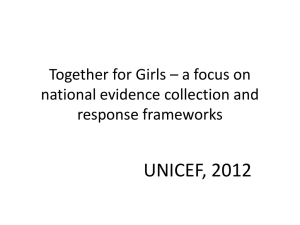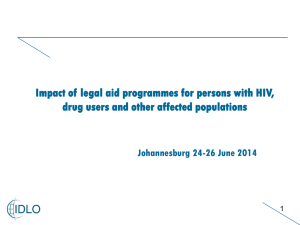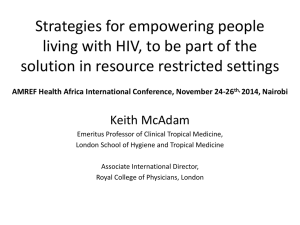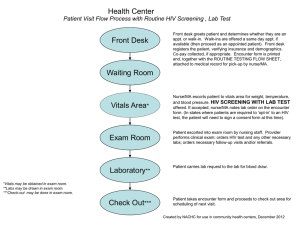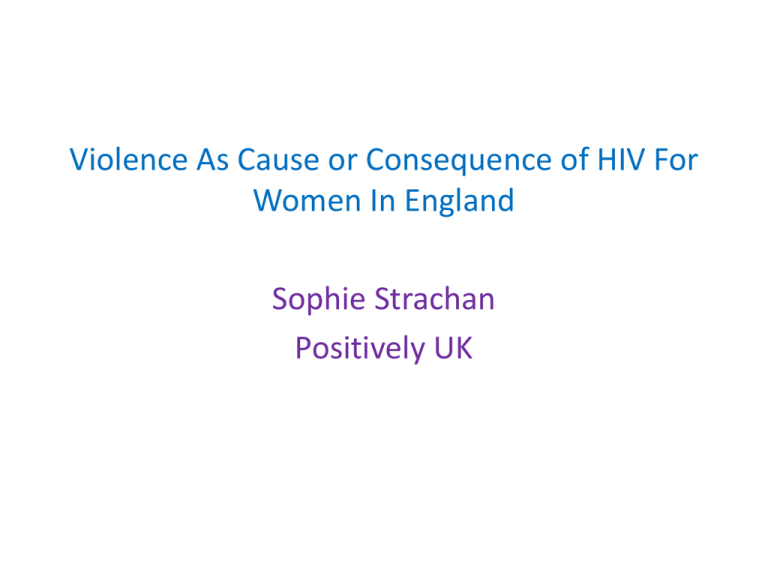
Violence As Cause or Consequence of HIV For
Women In England
Sophie Strachan
Positively UK
Introduction
A summary of the findings from the
Sophia Forums recent report on the
experiences of women living with HIV in
relation to Gender-Based Violence.
Feasibility Study
•
•
•
•
•
Exploring the potential for a national investigation into violence as a
cause and/or consequence of HIV for women in England.
Involving: surveying organisations accessed by women living with
HIV who have experienced GBV
In-depth interviews with staff from HIV support organisations,
providing services for women living with HIV to explore the above
issues in more depth
Consulting relevant stakeholders about evidence gaps at the
intersection of HIV and GBV
Running a stakeholders event
Findings
• The study found:
• Few HIV support organisations accessed by women routinely collect
data about women’s experiences of GBV
• Few GBV support organisations collect data about a women's HIV
status
• Among migrant women, GBV may have taken place in their home
country and may be on-going in the UK
• Women living with HIV and experiencing GBV deal with multiple
‘layers of stigma’ and complex health and personal issues
Further Findings
• There are questions around who is best placed to identify women
experiencing GBV and what effective care pathways can be
established
• Finite resources mean that there is sometimes a reluctance to
develop partnership working between HIV and GBV organisations
• Gaps in responses:
• Due to insufficient lead time to obtain clearance required by police
and prisons there is no gathering of information from:
• London metropolitan police
• Prisons
• Department of health
• Home Office
• Health protection agency
Recommendations
• A good practice guidance toolkit should be developed in order to
recognise the variety of challenges faced by women living with HIV
• Training packages should be developed that challenge cultural
norms of the acceptability of GBV against women living with HIV
• There needs to be a more thorough mapping of HIV support
services and a proactive development of partnerships with sectors
that are already involved in elements of this work
• In the longer term, mixed method research is needed to delineate
the true extent of the HIV/GBV intersection and to understand the
impact of BGV at both the individual and societal level.
HIV Behind Bars
Looking in-depth at
Human Rights Abuse in
UK prisons including
Gender-Based Violence
What is Gender Based Violence ?
‘ Violence against positive women is any act, structure or
process in which power is exerted in such a way as to
cause physical, sexual, psychological, financial or legal
harm to women living with HIV’
Hale &Vazquez, 2011
Identifying forms of Gender Based Violence
prior to imprisonment
• Sexual violence such as rape, coercion and sex work. Multiple
trauma through genocide, loss of family, rape by soldiers/prison
guards
• Childhood sexual abuse, molestation, exposure to family violence
• Imbalance of power within relationships imbedded in our
culture/social conformity. Most women are not aware they are
experiencing gender based violence
• Ostracised by family/community due to HIV status. Psychological
violence with use of shaming language, silencing the partner
(women)
• Poverty drives coercion into drug trafficking, distorted belief due to
living with HIV of nothing to lose and promise of financial gain,
access to treatment.
Our experience of supporting women in
prison
• A large percentage of the women currently serving sentences are
migrants who have been used as drug mules
• Average sentence is between 18 months and 12 years
• All of them have experienced GBV prior to being imprisoned and
experience it from within the prison and from family members
• The women are not able to acknowledge the full extent of their
trauma pre imprisonment (lack of insight to what constitutes
violence, trying to deal with the trauma of separation children, family
• The stigma and discrimination they experience directly or indirectly
within prison itself, be that linked to their HIV, a mother being
incarcerated, mental health, drug user, sex worker, or sexual
orientation
• Women are re-traumatised on entering prison
Basic Human Rights
• Article 8
Right to Privacy and Dignity
• Article 3
Freedom from torture, inhumane and
degrading treatment and punishment
Institutional Abuse
• A quote from a women currently in prison, one officer who continues
to bully her, said in front of another women ‘she does not need any
help, what she needs is to be dead’
• Misuse of power- A women with a severe mobility condition arrived
late at the dispensing hatch for medication, the nurse shut the hatch
in the women's face and told her to come back in the afternoon,
knowing that she needed to take her antiretroviral medication as
prescribed.
• Emotional Abuse- A women in prison being told she is making up
her health problems and being a pain, having her walking stick
taken off her by health care staff so she couldn’t move a round the
prison.
Institutional Abuse
• Direct discrimination from staff and people incarcerated
• Confidentiality is compromised in prison, frequently not upheld at all.
Staff dispensing ARV’s in front of other people incarcerated,
increases anxiety for the person living with HIV regarding potential
persecution
• Despite raising the issue of discrimination with appropriate
governors in the prison it is not addressed effectively as women still
report on-going psychological and emotional abuse, this has
resulted in women being moved to different prisons due to the
severity of discrimination and it then continues in the next prison
• Right to confidentiality, privacy and freedom of speech denied when
prison officers insist on remaining present in consultations when
visiting hospital appointments.
Equality for All??
• Successive Governments have committed to ‘equitable’ healthcare
for people in prison with that received by the general public from the
NHS
• BUT…
• People living with HIV in UK prisons are frequently denied
immediate access to life saving medication, with waiting times of up
to 5 months.
• Emotional and psychological support is not available to support the
needs of those living with HIV or diagnosed in prison.
• Time and staff constraints frequently leaves hospital appointments
not attended or adequate health care not given due to poor
communication, patient cannot be prepared for certain procedures.
Conclusion
Violence is used to achieve and assert power and control over others.
Violence is at the very core of the prison structure, immediate loss of
liberty and freedom brings about intense feelings of powerlessness and
oppression for women. We have seen today the multiple layers of how
violence is acted out. These women have already experienced
immense emotional and at time physical pain, uprooted and dispersed
from their families and communities.
In failing to act we remain in collusion
with the perpetrators of violence
Supporting Women Vulnerable to Gender
Based Violence
Thank you
Our reports can be accessed via our website:
www.positivelyuk.org
Sophia Forum website:
http://www.sophiaforum.net/events/launch-of-report-on-gbv-and-hiv-inengland.html
Study on Prostitution in London 2012
http://www.eavesforwomen.org.uk/news-events/news/CapitalExploits
sstrachan@positivelyuk.org

